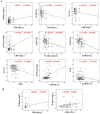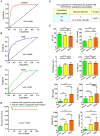Coagulation parameters abnormalities and their relation to clinical outcomes in hospitalized and severe COVID-19 patients: prospective study
- PMID: 35915103
- PMCID: PMC9340692
- DOI: 10.1038/s41598-022-16915-8
Coagulation parameters abnormalities and their relation to clinical outcomes in hospitalized and severe COVID-19 patients: prospective study
Abstract
There has been growing attention toward the predictive value of the coagulation parameters abnormalities in COVID-19. The aim of the study was to investigate the role of coagulation parameters namely Prothrombin concentration (PC), activated Partial thromboplastin Time (aPTT), D-Dimer (DD), Anti Thrombin III (ATIII) and fibrinogen (Fg) together with hematological, and biochemical parameters in predicting the severity of COVID-19 patients and estimating their relation to clinical outcomes in hospitalized and severe COVID-19 Patients. In a prospective study, a total of 267 newly diagnosed COVID-19 patients were enrolled. They were divided into two groups; hospitalized group which included 144 patients and non-hospitalized group that included 123 patients. According to severity, the patients were divided into severe group which included 71 patients and non-severe group that included 196 patients who were admitted to ward or not hospitalized. Clinical evaluation, measurement of coagulation parameters, biochemical indices, outcome and survival data were recorded. Hospitalized and severe patients were older and commonly presented with dyspnea (P ≤ 0.001). Differences in coagulation parameters were highly significant in hospitalized and severe groups in almost all parameters, same for inflammatory markers. D-dimer, AT-III and LDH showed excellent independently prediction of severity risk. With a cut-off of > 2.0 ng/L, the sensitivity and specificity of D dimer in predicting severity were 76% and 93%, respectively. Patients with coagulation abnormalities showed worse survival than those without (p = 0.002). Early assessment and dynamic monitoring of coagulation parameters may be a benchmark in the prediction of COVID-19 severity and death.
© 2022. The Author(s).
Conflict of interest statement
The authors declare no competing interests.
Figures


Similar articles
-
Changes in coagulation indices and D-dimer levels in hypertriglyceridemic acute pancreatitis and their value in predicting disease severity.Zhong Nan Da Xue Xue Bao Yi Xue Ban. 2023 Jul 28;48(7):1050-1058. doi: 10.11817/j.issn.1672-7347.2023.230155. Zhong Nan Da Xue Xue Bao Yi Xue Ban. 2023. PMID: 37724408 Free PMC article. Chinese, English.
-
D-Dimer and Prothrombin Time Are the Significant Indicators of Severe COVID-19 and Poor Prognosis.Biomed Res Int. 2020 Jun 16;2020:6159720. doi: 10.1155/2020/6159720. eCollection 2020. Biomed Res Int. 2020. PMID: 32596339 Free PMC article.
-
Predictive value of D-Dimer and thromboplastin time as coagulation indicators for COVID-19 patients.J Infect Dev Ctries. 2024 May 30;18(5):666-671. doi: 10.3855/jidc.18593. J Infect Dev Ctries. 2024. PMID: 38865388
-
COVID-19 and coagulation dysfunction in adults: A systematic review and meta-analysis.J Med Virol. 2021 Feb;93(2):934-944. doi: 10.1002/jmv.26346. Epub 2020 Aug 2. J Med Virol. 2021. PMID: 32706426 Free PMC article.
-
Meta-analysis of coagulation parameters associated with disease severity and poor prognosis of COVID-19.Int J Infect Dis. 2020 Nov;100:441-448. doi: 10.1016/j.ijid.2020.09.021. Epub 2020 Sep 15. Int J Infect Dis. 2020. PMID: 32947052 Free PMC article.
Cited by
-
The Joint Effect of Renal Function Status and Coagulation Biomarkers on In-Hospital Outcomes in Acute Ischemic Stroke Patients With Intravenous Thrombolysis.Immun Inflamm Dis. 2024 Dec;12(12):e70099. doi: 10.1002/iid3.70099. Immun Inflamm Dis. 2024. PMID: 39660934 Free PMC article.
-
Investigation of the relationship between coagulation parameters and mortality in COVID-19 infection.Blood Sci. 2024 Apr 30;6(2):e00191. doi: 10.1097/BS9.0000000000000191. eCollection 2024 Apr. Blood Sci. 2024. PMID: 38694496 Free PMC article.
-
Serum Lactate Dehydrogenase Levels Reflect the Lung Injury Extension in COVID-19 Patients at Hospital Admission.Immun Inflamm Dis. 2025 Mar;13(3):e70168. doi: 10.1002/iid3.70168. Immun Inflamm Dis. 2025. PMID: 40071734 Free PMC article.
-
Hyperexpression of PTAFR and PF4 as Possible Platelet Risk Biomarkers in Patients With COVID-19.In Vivo. 2024 Nov-Dec;38(6):2853-2863. doi: 10.21873/invivo.13766. In Vivo. 2024. PMID: 39477442 Free PMC article.
-
Liver Damage and Impaired Coagulation in COVID-19 Patients: A Case Series.Diseases. 2023 Oct 13;11(4):141. doi: 10.3390/diseases11040141. Diseases. 2023. PMID: 37873785 Free PMC article.
References
-
- Arifputra J, Haroen H, Rotty LWA, Lasut PFC, Hendratta C. Coagulopathy of coronavirus disease 2019: A case series. Open Access Macedonian J. Med. Sci. 2021;9:301–307. doi: 10.3889/oamjms.2021.6026. - DOI
-
- Organization WH. Laboratory testing for coronavirus disease 2019 (COVID-19) in suspected human cases: interim guidance, 2 March 2020. World Health Organization, 2020.
Publication types
MeSH terms
Substances
LinkOut - more resources
Full Text Sources
Medical
Research Materials
Miscellaneous

